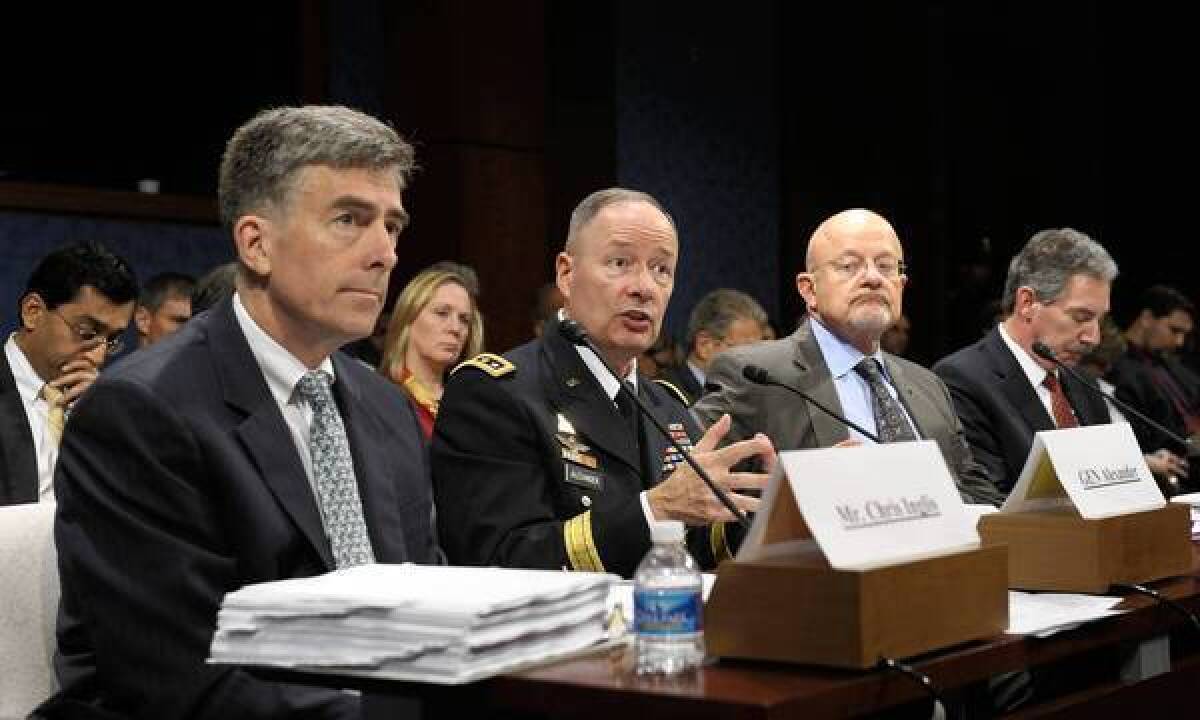Europeans handed over phone records, U.S. says

- Share via
WASHINGTON — Stung by reports of widespread spying on allies, U.S. officials revealed Tuesday that European intelligence services gave the National Security Agency records of tens of millions of telephone calls in joint surveillance operations.
By pointing the finger at European spy services and disclosing intelligence efforts that normally are carefully guarded secrets, U.S. officials demonstrated how deeply the agency has been wounded by leaks from former NSA contractor Edward Snowden that exposed its vast operations around the globe.
The phone records collected by the Europeans and shared with the NSA were from war zones and other areas outside their borders, officials said. The NSA still faces sharp criticism over a separate effort to listen in on the communications of foreign leaders, including German Chancellor Angela Merkel.
Despite the political outcry in much of Europe as disclosures of surveillance multiplied, U.S. intelligence officials had avoided blaming partner agencies until now because of diplomatic sensitivities. The latest twist in the Snowden saga is likely to spark domestic anger against allied governments, and could jeopardize cooperation with the NSA and other U.S. intelligence agencies.
But America’s top intelligence officials and their congressional allies clearly felt the need to refute damaging news reports in Europe about alleged NSA surveillance nets in France, Spain, Italy and elsewhere, even if it meant blowing sensitive agreements.
Testifying before the House Intelligence Committee, Gen. Keith Alexander, the NSA director, disputed published reports that the agency had obtained data from more than 170 million French, Spanish and Italian phone calls in a 30-day period, from early December 2012 to early January 2013. The data allegedly came from an NSA software tool called Boundless Informant.
Alexander said the call records were provided by “foreign partners.”
“This is not information that we collected on European citizens,” he said. “It represents information that we and our NATO allies have collected in defense of our countries and in support of military operations.”
Under questioning from Rep. Mike Rogers (R-Mich.), the committee chairman, Alexander said the records were of calls “external to the country in which it was reported.” He said neither the reporters nor Snowden understood how to interpret the classified documents.
In interviews, U.S. intelligence officials refused to say how the database was assembled or used, but suggested the phone records were related to counter-terrorism and force-protection efforts for U.S. and NATO troops in Afghanistan and elsewhere.
The disclosures about eavesdropping on foreign leaders have put intense pressure on the NSA and the White House, and led to a scathing rebuke Monday by Sen. Dianne Feinstein (D-Calif.), chair of the Senate Intelligence Committee.
Feinstein, normally a staunch supporter of the Obama administration, said the committee was not informed of the spying on friendly leaders. Saying she is “totally opposed” to the practice, she vowed to launch a committee investigation. She also said the White House had informed her that such surveillance would not continue.
White House officials have sought to distance themselves, and point to an ongoing review of U.S. spying practices that is to be completed in December. Intelligence officials pushed back in private, saying they felt scapegoated for collecting intelligence based on priorities set in the White House.
Appearing at the House hearing Tuesday, James R. Clapper, the director of national intelligence, said White House officials who read intelligence reports are usually told when information has come from wiretaps. In addition, the National Security Council expert on a given country is typically given results of monitoring of a particular leader, he said.
Divining the intentions of foreign leaders, friends and foes alike, has always been a top priority for U.S. intelligence, Clapper said. “It’s one of the first things I learned in intel school in 1963,” he said.
Most countries, allies included, spy on the United States, Clapper said. “Some of this reminds me a lot of the classic movie ‘Casablanca,’” he said. “‘My God, there’s gambling going on here?’ You know, it’s the same kind of thing.”
The interception of communications — signals intelligence, also known as SIGINT — is an invaluable tool, he said, without responding to reports that President Obama might restrict such efforts.
“In problem after problem after problem, SIGINT is the major contributor to insight. And I’m talking about hundreds and hundreds of targets.... It’s hard to overstate it,” he said.
But some Democrats on the committee complained that lawmakers were not told about the spying on allied leaders.
“If you’re tapping the phone of an ally, that is a significant intelligence activity that should be reported to the committee,” said Rep. Adam B. Schiff (D-Burbank). “We have a lot more work to do with you in terms of getting the information we need.”
More to Read
Sign up for Essential California
The most important California stories and recommendations in your inbox every morning.
You may occasionally receive promotional content from the Los Angeles Times.













